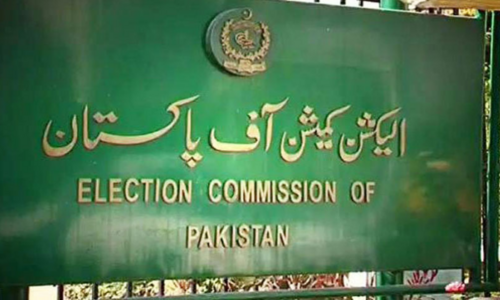ISLAMABAD: The Pakistan Tehreek-i-Insaf on Tuesday approached the Supreme Court seeking a declaration that the delimitation schedule announced by the Election Commission of Pakistan (ECP) on April 11 is ‘illegal’ and ‘unconstitutional’.
The petition, drafted by Advocates Faisal Chaudhry and Fawad Chaudhry, also requested the apex court to order the ECP and secretary to ensure the upcoming electoral process in accordance with law and the Constitution and without wasting any time or creating delay.
The petition contended that the endeavour by the ECP to carry out new delimitation of provincial and national constituencies across the country and the subsequent schedule it issued amounted to departure of Article 51(5). As the delimitation exercise conducted in 2018 on the command of the Constitution has to be considered final till the new census takes place, therefore, the ECP was bound to hold elections on the basis of delimitation conducted previously.
It argued that the exercise of delimitation of constituencies which was conducted in 2018 by the ECP through its notification dated May 3, 2018 was exhaustive for all intents and purposes till a new census. The petition pointed out that the delimitation based on the 2017 census had already been conducted on the sovereign command of the Constitution and the parliament, and no new census had been conducted or published afterwards. This also indicated that mandatory conditions laid in Article 51, read with Chapter III of the Elections Act, 2017, to conduct new delimitation, had not been followed, it said, adding that in such circumstances, the fresh delimitation process was unconstitutional and illegal.
Electoral reforms, including transparent selection of ECP members and CEC, proposed
The petition requested the SC to intervene forthwith to save the constituents from the blunt of ‘illegal and unconstitutional’ delimitation.
Electoral reforms
Meanwhile, PATTAN and Coalition-38 — a network promoting the idea of responsible voters for responsible leadership — proposed on Tuesday a set of electoral reforms, including the adoption of a transparent method to select its members as well as Chief Election Commissioner (CEC).
The ECP has been incomplete since the last week of July 2021 when two of its four members — from Khyber Pakhtunkhwa and Punjab — had retired.
Calling for adoption of a transparent method to select ECP members and CEC, the civil society network emphasised that nomination process should start at least six months before the completion of the tenures of incumbent CEC and ECP members to avoid the intermittent vacuum that the commission continued to suffer from.
It said profiles of the nominees as well as the minutes of the meetings held in this regard should be made public and the same process should be adopted for setting up of caretaker government. “For the last many years, we have been experiencing a severe deadlock when time comes to appoint CEC, members of the Commission and caretaker set-up. As a result compromises are made, which severely damage trust of the people in politicians and creates doubts about the conduct of elections,” it explained.
Intra-party democracy
The network noted that democratically-run political parties were the backbone of democratic governance as intra-party democracy was also guaranteed by Chapter XI of the Elections Act 2017, however, the ECP seemed to be negligent in implementing the law in letter and spirit.
It suggested that the ECP to deprive the parties of election symbols if they fail to work according to Sections 202 (5), 206, 208, 215 (1), (2), (4), (5). The network urged the ECP to set up a separate unit to monitor and report working of all registered parties in line with relevant sections of the law.
It observed that that most parties had become “more undemocratic in the last few years”, strengthening the stranglehold of a “few dynasties over our polity and governance”.
According to PATTAN and Coalition-38, when political and economic monopolies overlap, they cause devastation to governance. Therefore, to deepen democracy and empower electorates, it is imperative to end monopolies. The network observed that around 200 families controlled Pakistan’s politics, legislatures and almost the same families controlled business corporations. “This is not sustainable,” it noted.
40 by-polls on average
After every general election, on average 40 by-elections were held, as some candidates won from more than one seat, it said, adding that due to the vacation of seats, around Rs90 million was spent on by-elections. “Contesting elections from multiple seats doesn’t exist anywhere in the world in this form. This practice must be stopped,” it suggested.
As nearly 40pc of parliament and 22pc of provincial assemblies comprised members not directly elected, the end of indirect method of election would help deepen trust of the people in system and democracy, it observed. It would also diminish control of party leaders and sycophancy as directly elected officials would feel accountable to their constituents too.
PATTAN also backed the idea of electronic voting machines and I-voting for the overseas Pakistanis for next general election in light of Sections 103 and 94 of the Elections Act, order of the Supreme Court, pillar 8 of the ECP’s Strategic Plan 2019-23, and ECP’s report on the pilot use of EVM.
Published in Dawn, April 20th, 2022













































